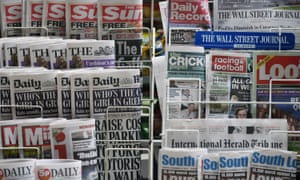
Newspaper publishers have warned that if a would-be regulator funded by Max Mosley is formally recognised it would amount to “an attack on free speech” and expose the press to punitive and damaging legal costs.
The News Media Association (NMA) said it would be dangerous for approval to be given to Impress by the Press Recognition Panel at a meeting on Tuesday because it could lead to the triggering of legislation that will expose newspapers not signed up to its regime to pay the costs of both sides regardless of whether a complaint is rejected.
Lynne Anderson, the deputy chief executive of the NMA, said that Impress was “not independent, it is not funded by the industry but by a wealthy donor, it has no significant relevant publishers, it has no code of standards and it is not viable”.
Most major newspapers have their complaints handled by Ipso, which has refused to accept recognition by the Press Regulation Panel, arguing it would amount to state regulation. Some others, such as the Guardian and the Financial Times, have their own system of regulation – and none is a member of Impress.

Anderson added: “Recognising Impress would not create an effective press regulator but it would be an attack on free speech, imposing on 90% of the newspaper and magazine industry who have joined an effective self-regulator, Ipso, a system of punitive costs and damages designed to coerce them into compliance with a state-sponsored system of regulation.”
Recognition of any press regulator is meant to trigger section 40 of the Crime and Courts Act 2013, which would expose any newspaper not signed up to its regime to exemplary damages in libel cases and impose so-called cost-shifting.
Although the exemplary damages part of the act is already on the books, former culture secretary John Whittingdale decided last year not to commence cost-shifting under section 40 of the act. However, those in the industry say they expect a decision to recognise Impress would be followed by renewed calls to implement the legislation in full.
In an awkward appearance in front of the culture, media and sport select committee on Monday, the culture secretary, Karen Bradley, repeatedly refused to say when or if she would bring in cost-shifting. “I am considering the position very carefully,” she told the committee. “I have not made a decision about timing, and I certainly do not rule out commencing section 40 at some point in the future.”
Supporters of the section 40 legislation, which received cross-party support in the wake of the Leveson inquiry, claim it will help those with limited resources take on newspapers that print false stories about them. It is also designed to protect newspapers from paying costs awarded by judges if those taking them to court do not try working through an arbitration process.
However, newspapers say it will be abused by the rich and powerful to stifle the press and taken advantage of by lawyers pursuing spurious claims in the knowledge they will still be paid.
In the run-up to the PRP meeting, newspapers have used their leader columns to argue against imposing the costs rule. On Monday, the Sun made a direct appeal to the prime minister, Theresa May, not to allow “this historic calamity to happen on your watch”, describing it as “state-sponsored blackmail”.
The leader echoed its sister title, the Times, which last Thursday described the system of state-backed regulation as “inimical to freedom of expression” and said section 40 would create “perverse incentives” for the rich to intimidate the press. Pieces in the Daily Mail and the Telegraph made similar arguments.
Industry sources said many newspaper owners would continue to fight state-backed regulation if Impress is recognised, both through legal challenges and by trying to convince the government not to impose legislation that would force those who do not join to pay the costs of both sides in libel cases even if they win.
Avenues being considered include appeals under the Human Rights Act over freedom of expression and access to justice, and attempts to challenge the legitimacy of Impress in the UK courts.
Impress has so far been largely funded by £3.8m from Mosley, who won a privacy case against the News of the World over false claims he was involved in a “sick Nazi orgy” and has been one of the leading voices calling for tighter regulation of the press.
Ipso declined to comment on Tuesday’s meeting, but its chair, Sir Alan Moses, last week said the UK press would be “doomed” if it signed up to state-backed regulation. Referring to section 40, he told the Society of Editors conference in Carlisle: “You should be wary, very wary, very wary indeed of anything that looks like an attempt too corral you into submission.”